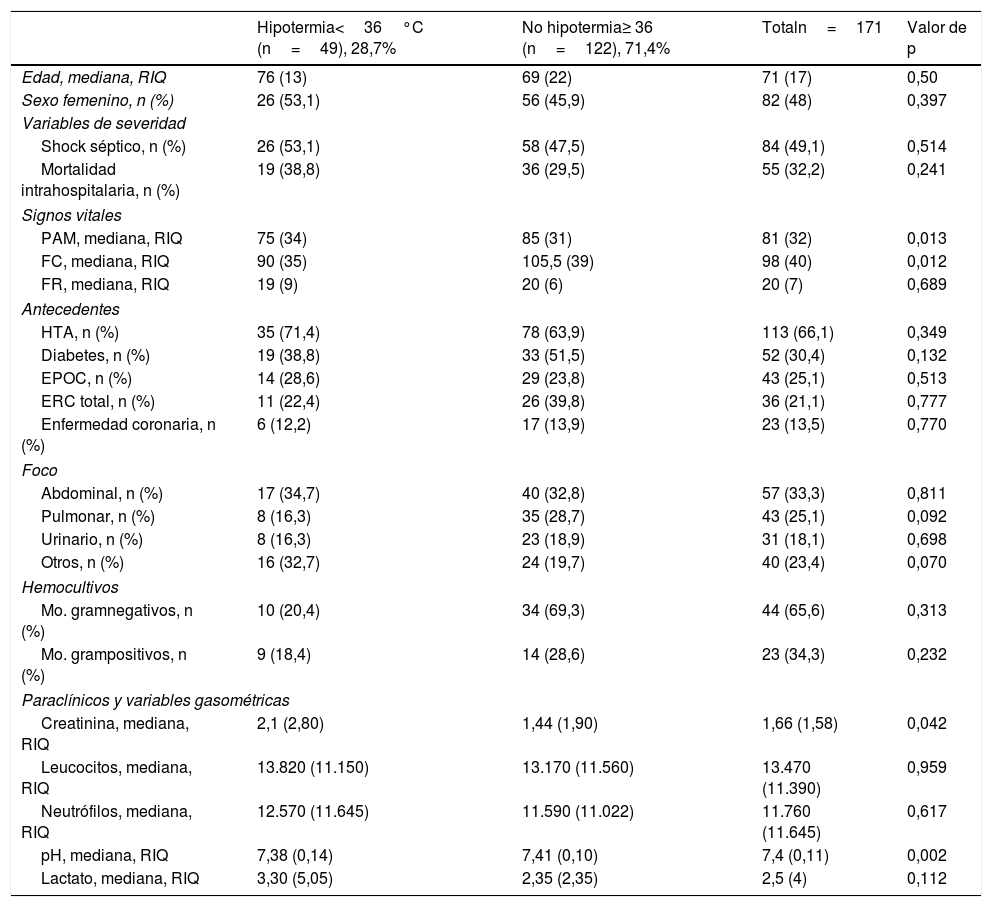Estimar asociación entre temperatura corporal y mortalidad intrahospitalaria.
DiseñoEstudio observacional analítico de cohortes prospectiva entre febrero y julio del 2017 en pacientes con diagnóstico de sepsis que ingresaron a un hospital de iv nivel; se tomó temperatura digital y el desenlace fue mortalidad intrahospitalaria.
Marco de referenciaLa asociación entre temperatura corporal y mortalidad intrahospitalaria en sepsis es controvertida. Estudios denotan que la fiebre aumenta el consumo de oxígeno y empeora la disfunción multiorgánica y la contraparte, que esta ayuda al control de patógeno.
PacientesIngresados a la Sala de reanimación de Méderi Hospital Universitario Mayor, con sepsis que ingresaron consecutivamente por 6 meses que cumplieron los criterios de inclusión y exclusión.
Intervenciones y medicionesSe tomó la temperatura digital axilar al ingreso protocolizada (termómetro digital, único, avalado y con garantía de calibración).
ResultadosEl riesgo relativo para mortalidad intrahospitalaria en pacientes sépticos, según hipotermia vs. no hipotermia fue de 1,58, intervalo de confianza del 95%, 0,85-2,84, p=0,056. La incidencia de muerte en los pacientes hipotérmicos fue de 4,2 por 100 días paciente hospitalizado comparada con una incidencia de muerte en los pacientes sin hipotermia de 2,6 por 100 días-paciente hospitalizado, no siendo estadísticamente significativo (p=0,056).
ConclusionesEn esta cohorte no se encontró asociación directa entre temperatura corporal y mortalidad intrahospitalaria, pero sí hay una tendencia, aunque no estadísticamente significativa, entre presentar hipotermia y mortalidad. En esta población los factores más asociados a mortalidad intrahospitalaria fueron foco pulmonar y shock séptico.
To estimate the relationship between body temperature on admission and hospital mortality.
DesignProspective analytical observational cohort study conducted between February and July 2017 on patients diagnosed with sepsis, and who were admitted to fourth level hospital. Digital temperature was taken, and the outcome was in-hospital mortality.
FrameworkThe association between body temperature and hospital mortality in sepsis is controversial. Studies show that fever increases oxygen consumption and worsens multi-organ dysfunction, and the counterpart is, that it helps control pathogens.
PatientsPatients admitted consecutively over a 6-month period to the Resuscitation room of Méderi Hospital Universitario Mayor with sepsis and met the inclusion and exclusion criteria.
Interventions and measurementsThe axillary digital temperature was taken upon admission, using a standardised digital thermometer, guaranteed and with a calibration guarantee).
ResultsThe relative risk for in-hospital mortality in septic patients, according to hypothermia vs no-hypothermia was 1.58, 95%, confidence interval 0.85-2.84, P=.056. The incidence of death in hypothermic patients was 4.2 per 100 hospital admission days, compared to an incidence of death in non-hypothermic patients of 2.6 per 100 patient hospital admission days. This was not statistically significant (P=.056).
ConclusionsAlthough there is a non-statistically significant trend between presenting with hypothermia and mortality, there was no direct association in this cohort between body temperature and in-hospital mortality. In this population, the factors most associated with in-hospital mortality were pulmonary foci and septic shock.
Article
Socios de la Asociación de Medicina Crítica y Cuidado Intensivo
Para acceder a la revista
Es necesario que lo haga desde la zona privada de la web de la AMCI, clique aquí











